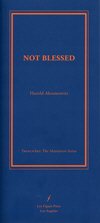Not Blessed
The best writers tell the same story over and over again. In his new book, Harold Abramowitz takes this idea to an extreme. Not Blessed consists of 28 chapters, each between two and three pages in length. Each chapter in this slim volume tells the same story: A boy wanders from his grandmother’s house, gets lost in the woods, and is rescued by a policeman.
The best writers tell the same story over and over again. In his new book, Harold Abramowitz takes this idea to an extreme. Not Blessed consists of 28 chapters, each between two and three pages in length. Each chapter in this slim volume tells the same story: A boy wanders from his grandmother’s house, gets lost in the woods, and is rescued by a policeman.
But the plot is not the point. The book’s power stems from the variations in the episode. Each time, the narrator frames the story in a different fashion, adds and subtracts details, shifts the tone, and alters the sequence of events. Some of the variations introduce new information or a new point of view. Others are as small as the addition of an adjective or adverb. Inevitably, the reader starts to question whether or not the narrator can be trusted.
The technique has plenty of precedent. Poet Wallace Stevens does something similar in Thirteen Ways of Looking at a Blackbird. Novelists such as William Faulkner and Toni Morrison made careers from stories told from multiple points of view. And in The Savage Detectives, one of the most celebrated novels of the decade, Roberto Bolano reveals the biography of his literary alter ego through a multiplicity of monologues.
What distinguishes Not Blessed is the relentlessness of the repetition. The effect is one of déjà vu, like having a conversation with a trauma victim or someone who suffers from amnesia or dementia. From the way the narrator repeats sentences verbatim in multiple chapters, one senses that Abramowitz enjoys orienting and disorienting – if not intentionally frustrating – the reader. Taken as a whole, the stories form a mosaic that testifies to the power and limits of language and memory.
The fixation and compulsion throughout Not Blessed recalls the scene in The Great Gatsby when the narrator Nick Carraway tells the lovesick Gatsby “you can’t repeat the past.” Gatsby dismisses the claim and then looks around “wildly, as if the past were lurking here in the shadow of his house, just out of reach of his hand.” But while Gatsby wants to win his ex-girlfriend’s heart, the narrator of Not Blessed has no such tangible goal. Instead, his inability to grasp the past leaves him in a state of paralysis and confusion:
And it is high time I made myself more clear. Forgive me for having been, thus far, obscure. In fact, I did not mean to lie. In fact, I meant to do the opposite. I mean always to tell the truth. It’s just that your line of questioning has been excellent and has allowed me an opportunity to reflect on the past, to remember that there are many different ways of viewing the past…certain principles need constant restating in order to be understood.
With all the circumlocutions and restatement, much goes unsaid. None of the characters have names. The locations are generic: e.g. village, woods, lake, and mountain. There’s mention of a war, but no reference to the participants or the outcome. And save a few minor references to electricity and technology, the story could take place in any century. As a result, Not Blessed feels like an archetypal fairy tale, albeit a fractured one.





